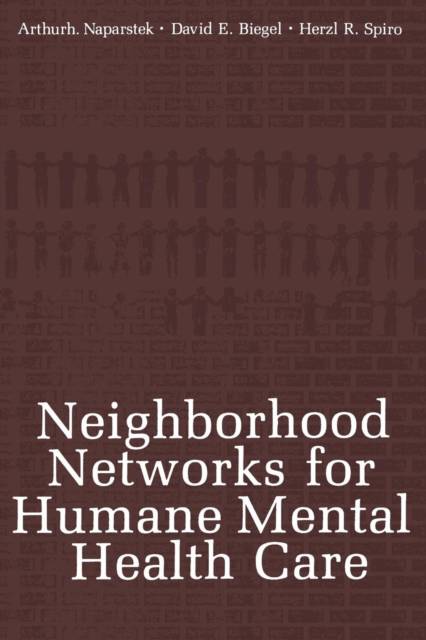
Je cadeautjes zeker op tijd in huis hebben voor de feestdagen? Kom langs in onze winkels en vind het perfecte geschenk!
- Afhalen na 1 uur in een winkel met voorraad
- Gratis thuislevering in België vanaf € 30
- Ruim aanbod met 7 miljoen producten
Je cadeautjes zeker op tijd in huis hebben voor de feestdagen? Kom langs in onze winkels en vind het perfecte geschenk!
- Afhalen na 1 uur in een winkel met voorraad
- Gratis thuislevering in België vanaf € 30
- Ruim aanbod met 7 miljoen producten
Zoeken
Neighborhood Networks for Humane Mental Health Care
Arthur J Naparstek, David E Biegel, Herzl R Spiro
Paperback | Engels
€ 83,95
+ 167 punten
Omschrijving
It is hard to think of a more timely and topical major contribution than Drs. Naparstek, Biegel, Spiro, and collaborators have provided in this volume. Their penetrating, comprehensive study and field tests give us mapping toward the goal of reifying the concept of "community" as applied to human services. The book will prove invaluable to those at the policy level-legislators, planners, and administrators. It will serve as an essential reference for community workers-professional provid- ers, natural helpers, and citizens as a whole. A salient ideal of New Federalism-placing governance as close to the people as practicable-seems a prophetic match with the model of Neighborhood Empowerment. As the authors point out, conventional wisdom has seemed to offer government regulation, control, and pro- gram evaluation as a panacea package for improving human services. This work suggests a radically different approach; specifically, a shift to greater instrumental involvement of the richly variegated mosaic of American neighborhoods, combined with a system of excellent, high technology service agencies. Certainly, genuine efforts have been made before toward a true linkage of the community with human services. The Great Society pro- grams, with their emphasis on citizen involvement and "maximum fea- sible participation" established the foundation for legitimate citizen/ consumer linkage with the program process. Yet, in so many instances, the results fell far short of expectations.
Specificaties
Betrokkenen
- Auteur(s):
- Uitgeverij:
Inhoud
- Aantal bladzijden:
- 238
- Taal:
- Engels
Eigenschappen
- Productcode (EAN):
- 9781468411485
- Verschijningsdatum:
- 14/02/2012
- Uitvoering:
- Paperback
- Formaat:
- Trade paperback (VS)
- Afmetingen:
- 152 mm x 229 mm
- Gewicht:
- 326 g

Alleen bij Standaard Boekhandel
+ 167 punten op je klantenkaart van Standaard Boekhandel
Beoordelingen
We publiceren alleen reviews die voldoen aan de voorwaarden voor reviews. Bekijk onze voorwaarden voor reviews.









